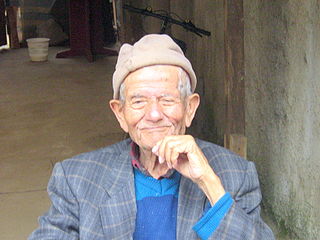Related Research Articles
Confirmation bias is the tendency to search for, interpret, favor, and recall information in a way that confirms or supports one's prior beliefs or values. People display this bias when they select information that supports their views, ignoring contrary information, or when they interpret ambiguous evidence as supporting their existing attitudes. The effect is strongest for desired outcomes, for emotionally charged issues, and for deeply entrenched beliefs.

Happiness is a complex and multifaceted emotion that encompasses a range of positive feelings, from contentment to intense joy. It is often associated with positive life experiences, such as achieving goals, spending time with loved ones, or engaging in enjoyable activities. However, happiness can also arise spontaneously, without any apparent external cause.
In psychology, a mood is an affective state. In contrast to emotions or feelings, moods are less specific, less intense and less likely to be provoked or instantiated by a particular stimulus or event. Moods are typically described as having either a positive or negative valence. In other words, people usually talk about being in a good mood or a bad mood. There are many different factors that influence mood, and these can lead to positive or negative effects on mood.
Positive psychology is a field of psychological theory and research of optimal human functioning of people, groups, and institutions. It studies "positive subjective experience, positive individual traits, and positive institutions... it aims to improve quality of life."

Robin Dale Hanson is an associate professor of economics at George Mason University and a former research associate at the Future of Humanity Institute of Oxford University. He is known for his work on idea futures and markets, and he was involved in the creation of the Foresight Institute's Foresight Exchange and DARPA's FutureMAP project. He invented market scoring rules like LMSR used by prediction markets such as Consensus Point, and has conducted research on signalling. He also proposed the Great Filter hypothesis.

Martin Elias Peter Seligman is an American psychologist, educator, and author of self-help books. Seligman is a strong promoter within the scientific community of his theories of well-being and positive psychology. His theory of learned helplessness is popular among scientific and clinical psychologists. A Review of General Psychology survey, published in 2002, ranked Seligman as the 31st most cited psychologist of the 20th century.
The British Psychological Society (BPS) is a representative body for psychologists and psychology in the United Kingdom.

Curiosity is a quality related to inquisitive thinking such as exploration, investigation, and learning, evident in humans and other animals. Curiosity helps human development, from which derives the process of learning and desire to acquire knowledge and skill.

Gratitude, thankfulness, or gratefulness is a feeling of appreciation by a recipient of another's kindness. This kindness can be gifts, help, favors, or another form of generosity to another person.

Mihaly Robert Csikszentmihalyi was a Hungarian-American psychologist. He recognized and named the psychological concept of "flow", a highly focused mental state conducive to productivity. He was the Distinguished Professor of Psychology and Management at Claremont Graduate University. Earlier, he served as the head of the department of psychology at the University of Chicago and of the department of sociology and anthropology at Lake Forest College.
Affective forecasting, also known as hedonic forecasting or the hedonic forecasting mechanism, is the prediction of one's affect in the future. As a process that influences preferences, decisions, and behavior, affective forecasting is studied by both psychologists and economists, with broad applications.

Geoffrey Franklin Miller is an American evolutionary psychologist, author, and associate professor of psychology at the University of New Mexico. He is known for his research on sexual selection in human evolution.

Jonathan David Haidt is an American social psychologist and author. He is the Thomas Cooley Professor of Ethical Leadership at the New York University Stern School of Business. His main areas of study are the psychology of morality and moral emotions.
Thomas G. Plante is the Augustin Cardinal Bea, S.J. University Professor of psychology on the faculty of Santa Clara University and adjunct clinical professor of psychiatry and behavioral sciences at Stanford University School of Medicine. His ideas have been covered in Time Magazine and other news media with regard to sexual abuse by Roman Catholic priests, a focus of some of his research and clinical practice. He has also conducted research on exercise psychology, and on the health effects of spiritual and religious practice.
Robert Biswas-Diener is a positive psychologist, author and instructor at Portland State University. Biswas-Diener's mother is Carol Diener and his father is Ed Diener, both psychologists.
The VIA Inventory of Strengths (VIA-IS), formerly known as the Values in Action Inventory, is a proprietary psychological assessment measure designed to identify an individual's profile of "character strengths".
Robert A. Emmons is an American psychologist and professor at UC Davis. His research is in the field of personality psychology, emotion psychology, and psychology of religion.

The replication crisis is an ongoing methodological crisis in which the results of many scientific studies are difficult or impossible to reproduce. Because the reproducibility of empirical results is an essential part of the scientific method, such failures undermine the credibility of theories building on them and potentially call into question substantial parts of scientific knowledge.
Lea Waters is an Australian psychologist, speaker, author and researcher. She is a psychology professor at the University of Melbourne and was the founding director of the Centre for Positive Psychology in the University of Melbourne. In addition, she has affiliate positions at University of Michigan and sits on the Science Board of The University of California and Berkeley’s Greater Good Science Center. Her main areas of research are positive psychology, organisational psychology, education, leadership and parenting.

Robin Stern is an American psychoanalyst at Yale University, associate director for the Yale Center for Emotional Intelligence, an associate research scientist at the Yale Child Study Center, and is on the faculty of Teachers College, Columbia University.
References
- 1 2 Dalphonse, Sherri (November 26, 2020). "Why Gratitude May Be What Gets Us All Through These Troubling Times". Washingtonian. Retrieved July 9, 2021.
- 1 2 Hogenboom, Melissa. "Should women be grateful for help at home?". BBC. Retrieved July 9, 2021.
- ↑ Max, D. t (July 1, 2007). "Happiness 101". The New York Times. ISSN 0362-4331 . Retrieved July 9, 2021.
- ↑ "Reunion Reports". Cornell Alumni Magazine. September–October 2002. p. 78.
- ↑ Morrin, Richard, of the Washington Post (December 19, 2002). "I am curious (and in love)". The Courier-Journal. Retrieved July 9, 2021– via Newspapers.com.
{{cite news}}: CS1 maint: multiple names: authors list (link) - ↑ Kashdan, Todd (2020). "Curriculum Vitae" (PDF). Retrieved December 2, 2023.
- ↑ Goodwin, Bryan (March 19, 2020). Building a Curious School: Restore the Joy That Brought You to School. Corwin Press. pp. PT 112. ISBN 978-1-0718-0212-0.
- 1 2 3 Anderson, Nick (May 1, 2020). "George Mason University investigation faults professor for sexual talk with students in class and a hot tub, court records show". The Washington Post.
- ↑ Kinze, Susan (November 9, 2009). "Curious? That's the key to joy, psychologist says". The Idaho Statesman. Retrieved July 9, 2021– via Newspapers.com.
- ↑ Pollay, David J. (August 14, 2009). "Focus + Humility + Questions = Momentum". The Miami Herald. p. 140. Retrieved July 9, 2021– via newspapers.com.
- ↑ "For some, gratitude a way of life". The Atlanta Constitution. November 24, 2011. pp. F10. Retrieved July 9, 2021.
- ↑ Barakat, Matthew (May 1, 2020). "George Mason Professor Sues after Sanctions for Sex Talk". Associated Press News. Retrieved January 29, 2022.
- ↑ Burke, Lilah (May 4, 2020). "George Mason Faults Professor for Sexual Talk With Students". Inside Higher Ed. Retrieved June 8, 2021.
- 1 2 Quinn, Ryan (June 23, 2023). "George Mason U Professor Loses 'Anti-Male Bias' Suit". Inside Higher Ed. Retrieved August 18, 2023.
- ↑ Weiner, Rachel (June 22, 2023). "Court: Professor who went to strip club with students not 'anti-male bias' victim". The Washington Post.
- ↑ Reynolds, Anne (January 18, 2013). "Professor Kashdan Recognized with American Psychological Association Award". College of Humanities and Social Sciences, George Mason University. Retrieved July 9, 2021.
- ↑ Zautra, Alex J. (2012). "Review of Designing Positive Psychology". Journal of Positive Psychology. 7 (1). doi:10.1080/17439760.2011.614830. S2CID 143354851.
- ↑ Luiselli, James K. (August 22, 2014). "Review of Mindfulness, Acceptance, and Positive Psychology". New England Psychologist.
- ↑ Parks, Acacia C. (2011). "Review of Curious?". Journal of Positive Psychology. 6 (3). doi:10.1080/17439760.2011.565603. S2CID 144135373.Ferrell, Joseph (October 28, 2009). "The Happiness of Pursuit: A Review of Curious?". Greater Good Magazine.
- ↑ Parks, Acacia C. (2015). "Review of The Upside of Your Dark Side". International Journal of Wellbeing. 5 (1). doi: 10.5502/ijw.v5i1.5 . S2CID 142719075.Sansom, Lisa (October 2, 2014). "The Upside of Your Dark Side (book review)". Positive Psychology News.
- ↑ Reviews of The Art of Insubordination:
- "The Art of Insubordination (review)". Kirkus Reviews. December 15, 2021. Retrieved September 30, 2022.
- LeClaire, Amanda (March 4, 2022). "New book "The Art of Insubordination" challenges assumptions of dissent". WDET Detroit Public Radio. Retrieved September 6, 2024.